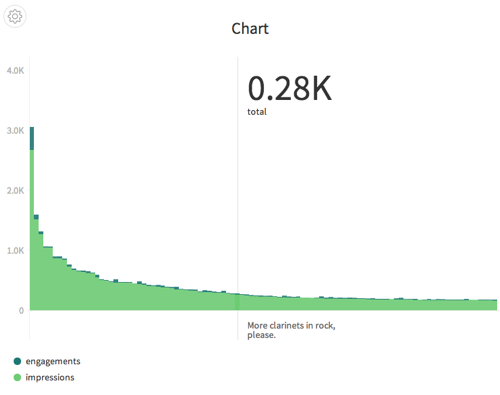Blog posts tagged tools
A new, speedy way to visualise data
 Businesses create more data than ever before. And even if you’ve not consciously set out to gather more information, your company probably has more statistics in more spreadsheets than you know what to do with.
Businesses create more data than ever before. And even if you’ve not consciously set out to gather more information, your company probably has more statistics in more spreadsheets than you know what to do with.
There’s knowledge buried in that data. The challenge is getting at it.
Visualisations can help
One of the problems with trying to interpret data is that it can be overwhelming. Contained in a spreadsheet or a text document, the figures can be tremendously daunting.
How do you identify the meaning in a list of hundreds or thousands of numbers?
A good way to start is by finding a way to visualise that data. Graphs and charts make it easier for us to see the trends and patterns buried in figures.
(This doesn’t always work, mind you – just witness the flood of bad infographics that have peppered the web over the last couple of years.)
Still, it’s worth a try. And now a new tool has come along to make visualising data that bit quicker and easier.
Introducing Charted
Charted is an online data visualisation tool created by the people who run popular content platform Medium.
It’s not a fully-featured charting app — it’s nowhere near as flexible as Excel’s chart functions, for instance — but that’s kind of the point.
What it lacks in features, it makes up in ease of use. Creating a chart in Charted is exceptionally straightforward. All you need to do is give it the URL of a shared document.
This can be a file that you’ve saved and shared on Google Drive, shared on Dropbox – or uploaded to any cloud storage service that lets you share files.
Once you’ve shared the document, just go to the Charted website and paste the URL into the big box there. Then hit Go. You’ll see a clear representation of your data, along with a couple of options.
Charted is great for sharing visualisations, because you can just send the Charted link to anyone you like.
The chart automatically resizes to fit the window in which it’s displayed. And if your source data changes, so does the chart (it updates itself every 30 minutes).
It’s easy to give it a go, right here.
Four brilliant free tools to help you learn something new

You don't need to be in a classroom to learn. (Image: Flickr user Cali4beach.)
If you're planning to learn something new this year, there are lots of free online resources that can help you.
Actually, there are so many places to learn online for free that it can get a little overwhelming. That's why we've identified four of the best places to gain knowledge that you can use in your business. Our list focuses on technology and IT resources, but you'll find lots of other subjects covered too.
To get lunchtime inspiration
TED has become an online phenomenon. This non-profit organisation is dedicated to 'ideas worth spreading', and it runs annual conferences that bring together leading thinkers from across disciplines.
It costs a lot to attend these conferences, but you can view the talks online for free. They feature some of the best speakers in the world and can be a first-rate source of new ideas and knowledge.
See the most popular TED talks >>
To learn little and often
Can you learn how to write computer code by spending a little time on it every day?
Over at Codecademy, they reckon you can, so they've created an online course that's easy to follow and sends you weekly emails to keep you motivated.
It starts from the absolute basics, so it's perfect for beginners. At the end of it you'll understand how to use JavaScript - a beginner-friendly programming language - and have an idea of how to build interactive websites.
To learn new software tips and tricks
Over at Think Tutorial, they have thousands of tutorials that show you how to do things using common software like Microsoft Office.
Each tutorial is brief and to the point, but if you've ever spent 20+ minutes working out how to insert a caption into a document or trying stop your computer making annoying sounds then this site could be a godsend.
Visit the Think Tutorial website >>
To learn almost anything
The Khan Academy aims to provide free education to anyone. That includes you!
There are over 3,800 videos to watch and exercises to follow - including a large section on computer science which starts with a reassuring reminder that you are smarter than a computer.
Khan Academy is geared to more academic subjects, but that doesn't mean it can't benefit your business.



